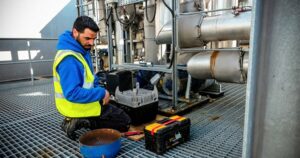What is water supply resilience?
Water resilience is a concept with increasing importance as communities and industries across the globe battle the effects of climate change. Where there is clean water scarcity and drought, water resilience finds itself in the spotlight.
More locally, in the commercial and construction sectors in Ireland, everyone from developers to property owners are becoming more conscious of water supply and use. On that note, let’s look at water resilience more broadly and how to ensure you don’t face any water supply disruption.
How to Improve Water Resilience

The Stockholm Resilience Centre states that “Water is an essential, defining element in human and natural systems. Human civilization and water systems have co-evolved as a coupled system, with the majority of natural freshwater systems transformed to meet our demands. Shifting patters of water availability in space and time will define key pathways and tipping points for our resilience, and thus requirements for water system resilience must guide the trajectories and boundaries of human development.”
Improving water resilience by rethinking water supply is already a target within the commercial and construction sectors. But what are examples of water resilience? Well, steps being taken to improve resilience include:
- Upgrading existing water filter systems and water treatment systems.
- Increasing reservoir storage capacity.
- Reusing water, e.g., using wastewater from domestic settings to irrigate fields.
- Better long-term planning, e.g., concrete water tank construction.
- Choosing more sustainable water pumps.
As well as the commercial and construction sectors, communities need to be mindful of issues such as flooding, aging piping systems, and water scarcity. Another way to tackle the issue of water resilience is to consider a decentralised water system.
What is a Decentralised Water System?
A decentralised water system will “convey, treat and dispose or reuse wastewater from small and low-density communities, buildings and dwellings in remote areas, individual public or private properties.”
This system uses smaller plants that help reduce piping needs. By treating the water “locally”, communities can reuse wastewater for non-potable applications such as dust reduction, washing, or irrigation. A decentralised water system is well-equipped to deal with:
- Floods or droughts.
- Water scarcity.
- Depletion of surface water or groundwater.
- Leaks in the piping network.
One last benefit of a decentralised water system is that while a large treatment plant might take several months to restart post-shutdown, this system can be mobilised in a matter of hours.
Ensure Water Resilience on your Project with Campion
If you’re working on a commercial or construction project and want to improve water resilience, Campion can help.
We have decades of experience helping developers, contractors, and property owners build and redesign their water systems to ensure uninterrupted water flow, and we can do the same for you.
To speak with one of our water experts about your project, contact Campion today.











